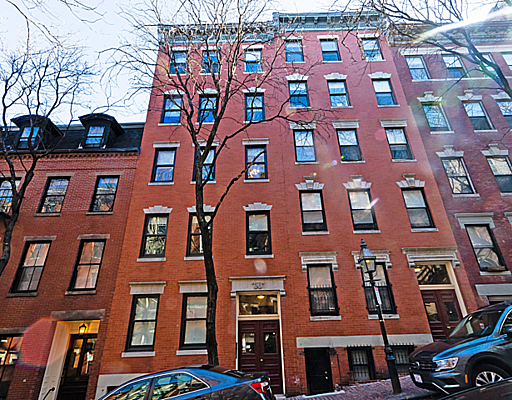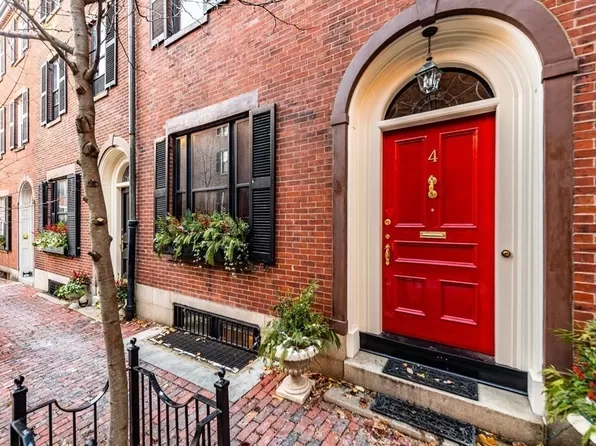Renting or Selling a Vacant Boston Condo? Here’s What You Need to Know
Boston Condos for Sale and Apartments for Rent
Renting or Selling a Vacant Boston Condo? Here’s What You Need to Know
Figuring out what to do with your house when you’re ready to move can be a big decision. Should you sell it and use the money for your next adventure, or keep it as a rental to build long-term wealth?
It’s a question many homeowners face, and the answer isn’t always straightforward. Whether you’re curious about the potential income from renting or worried about the responsibilities of being a landlord, there’s a lot to consider.
Let’s walk through some key questions to ask to help you make the best decision for your situation.
Is Your House a Good Fit for Renting?
Even if you’re interested in becoming a landlord, your current house might not be ideal for renting. Maybe you’re moving far away, so keeping up with the ongoing maintenance would be a hassle, the neighborhood isn’t great for rentals, or the house needs significant repairs before you could rent it out.
If any of this sounds like it might apply, selling might be your best option.
Are You Ready for the Realities of Being a Landlord?
Managing a rental property isn’t just about collecting rent checks. It’s a time-consuming and sometimes challenging job.
For example, you may get calls from tenants at all hours of the day with maintenance requests. Or you may find a tenant causes damage you have to repair before the next lease starts. You may even have to deal with people falling behind on payments or breaking their lease early. Investopedia highlights:
“It isn’t difficult to find horror stories of landlords troubled with more headaches than profits. Before deciding to rent, consider talking to other landlords and doing a detailed cost analysis. You might find that selling your home is a better financial decision and less stressful.”
Do You Have a Good Understanding of What It’ll Cost?
If you’re thinking about renting out your home primarily to generate extra income, remember that there are additional costs you’ll want to plan for. As an article from Bankrate explains:
- Mortgage and Property Taxes: You still need to pay these expenses, even if the rent doesn’t cover all of it.
- Insurance: Landlord insurance costs about 25% more than regular home insurance, and it’s necessary to cover damages and injuries.
- Maintenance and Repairs: Plan to spend at least 1% of the home’s value annually, more if the home is older.
- Finding a Tenant: This involves advertising costs and potentially paying for background checks.
- Vacancies: If the property sits empty between tenants, you’ll lose rental income.
- Management and HOA Fees: A property manager can ease the burden, but typically charges about 10% of the rent. HOA fees are an additional cost too, if applicable.
Boston Real Estate and the Bottom Line
To sum it all up, selling or renting out your home is a personal decision that depends on your circumstances. Whatever you decide, taking the time to evaluate your options will help you make the best choice for your future.
Make sure to weigh the pros and cons carefully and consult with professionals so you feel supported and informed as you make your decision. A real estate agent can be a great person to go to for advice.
Peace be with you
Ford Realty Beacon Hill – Condo for Sale Office
Visit our office at 137 Charles Street Rear, Beacon Hill MA 02114
Sorry we are experiencing system issues. Please try again.
Beacon Hill Condos for Sale
Updated: Boston Real Estate Blog 2024
Condo Broker 137 Charles St. Boston, MA 02114

Updated: Boston Real Estate Blog 2024
View Ford Realty Inc Google Reviews
Where is Ford Realty Located?
Ford Realty is located in 137 Charles Street in Beacon Hill
______________________________________________
Renting or Selling a Vacant Boston Condo? Here’s What You Need to Know
Renting or Selling a Vacant Boston Condo? Here’s What You Need to Know. Lets take a deep dive into the pros and cons.
In the ever-fluctuating Boston real estate landscape of 2023, uncertainty is your biggest adversary and knowledge, your strongest ally. Whether you’re an old hand in the property market or a novice entering the arena for the first time, deciding between renting or selling your vacant condo can be like navigating a labyrinth. But fear not – this comprehensive guide will arm you with all the crucial facts, factors and figures you need to make an informed decision. As we excavate deep into market trends, practical tips and expert advice, prepare to turn confusion into clarity and conquer those condo-related conundrums!
The decision about whether to rent out or sell a vacant condo depends on several key factors, including potential rental income, expenses, desired level of involvement in managing the property, and potential profit from selling. It is important to carefully consider all of these factors before making a decision. Additionally, location-specific market insights and resources like home value estimators can provide valuable information to inform this decision-making process.
First, Lets start on renting a vacant condo, and than we will proceed into selling a vacant condo.
Renting a Vacant Condo: Pros and Cons
Renting out a vacant condo can be a viable option for many property owners, but it also comes with its own set of pros and cons to consider. Let’s take a closer look at both sides of the equation.
Pros:
Firstly, renting out a vacant condo can provide a steady stream of income. With the rental market steadily growing in recent years, there is often high demand for rental properties, especially in urban areas. This means that you may be able to command competitive rental rates and generate significant income from your condo.
Another advantage of renting a vacant condo is the potential for long-term wealth accumulation. While selling a condo provides a one-time lump sum of money, renting it out allows you to build equity over time. As property values appreciate and you continue to pay down the mortgage with rental income, you can potentially benefit from the growing value of your investment.
Furthermore, renting out your vacant condo gives you flexibility in case you have future plans for the property. If you are not ready to sell or occupy the condo yourself, renting it out allows you to keep the option open. This can be particularly beneficial if you anticipate changes in your personal circumstances or want to hold onto the property as part of your real estate portfolio.
Cons:
On the flip side, renting out a vacant condo also comes with certain responsibilities and risks. One drawback is the need for ongoing maintenance and upkeep. As a landlord, you are responsible for ensuring that the property remains in good condition and addressing any repairs or maintenance issues that arise. This can require time, effort, and financial resources on your part.
Additionally, there is always some level of risk involved when dealing with tenants. While most tenants will be responsible and reliable, there is always a chance of encountering problematic tenants who may not pay rent on time or cause damage to your property. Conducting thorough background checks and screening potential tenants can help mitigate these risks, but they are still important factors to consider.
Another potential downside of renting out a vacant condo is the legal obligations and compliance requirements. Landlord-tenant laws vary by jurisdiction, and it is important to be aware of these regulations to avoid any legal disputes or penalties. It may be necessary to familiarize yourself with leasing agreements, local rent control ordinances, and other relevant laws to ensure that you are operating within the bounds of the law.
Now that we have explored the pros and cons of renting out a vacant condo, let’s move on to understanding the market overview and potential rental income that can be derived from such an investment.
Market Overview and Potential Rental Income
Before making a decision about renting out your vacant condo, it is crucial to conduct thorough market research and understand the potential rental income in your area. The rental market can vary significantly depending on location, demand, and other factors.
Start by researching similar properties in your neighborhood or area. Look for comparable condos or apartments that are currently being rented out to get an idea of the rental rates in your area. Take note of factors such as unit size, amenities, location, and condition to make accurate comparisons.
In addition to looking at current rental rates, it is also beneficial to consider the vacancy rate in your area. A high vacancy rate indicates a more competitive rental market, which may require you to adjust your rental price accordingly. Conversely, a low vacancy rate suggests high demand, allowing you to potentially charge higher rent.
To accurately estimate potential rental income, you should also factor in other costs associated with renting out a condo. These can include property management fees if you choose to hire a professional management service, repairs and maintenance expenses, insurance coverage for landlord protection, and any applicable taxes or utilities that you may cover.
By analyzing market trends and understanding the rental landscape in your area, you can set an appropriate rental price that is both competitive and aligns with your financial goals. It is important to strike a balance between maximizing rental income and ensuring that the price remains attractive to potential tenants.
- When considering renting out a vacant condo, it is essential to conduct thorough market research and understand the potential rental income in the area. It is necessary to research similar properties currently being rented out to get an idea of rental rates and accounting for factors such as size, amenities, location, and condition. Additionally, considering vacancy rates in your neighborhood can help adjust rental prices appropriately. To estimate potential income accurately, you should factor in other expenses associated with renting out a condo. Striking a balance between maximizing income and maintaining attractive pricing for potential tenants is crucial.
Risk Factors and Responsibilities of Renting
Renting out a vacant condo can provide a steady stream of income, but it also comes with its fair share of risks and responsibilities. Before deciding to become a landlord, it’s essential to understand and consider these factors carefully.
One significant risk factor is the potential for troublesome tenants. While thorough background checks are crucial in the tenant selection process, there is always a possibility of ending up with tenants who may cause property damage or fail to pay rent on time. This can lead to costly legal disputes and eviction proceedings.
Another responsibility of renting a vacant condo is the ongoing maintenance and upkeep. As the landlord, you’re responsible for ensuring that the property remains in good condition and meets all safety regulations. This includes handling repairs, addressing maintenance requests promptly, and conducting regular inspections. Neglecting these responsibilities could lead to unhappy tenants or even legal consequences.
For example, imagine you decide to rent out your vacant condo to a young couple. They seem responsible during the application process, but after moving in, they consistently violate community rules by hosting noisy parties late at night. Despite multiple warnings, they continue their disruptive behavior, ultimately causing frustration among other residents and leading to complaints filed against you as the landlord. This situation illustrates the risks associated with renting out a property.
Additionally, there are financial considerations when renting out a vacant condo. Property management fees, insurance costs, property taxes, and mortgage payments (if applicable) are some financial obligations directly related to being a landlord. It’s crucial to budget accordingly and ensure that rental income covers these expenses while still generating a profit.
Understanding local regulations and laws is vital when renting out a condo. There may be specific rules about lease agreements, security deposits, rent control measures, and eviction procedures that landlords must adhere to strictly. Failing to comply with these regulations could lead to legal trouble or severe penalties.
Considering these risk factors and responsibilities will help you decide whether renting out a vacant condo is the right choice for you. It requires careful planning, effective tenant management, and a commitment to fulfilling your duty as a landlord.
- According to a 2023 real estate report, rental demand has seen a year-over-year increase of approximately 3.3%.
- A SimplyWise survey from 2021 suggested that homeowners increasingly consider selling their properties in order to free up liquid assets.
- In 2023, the housing market became increasingly competitive with quality properties selling quickly and cash purchases becoming more commonplace, echoing trends from previous years according to industry reports.
Selling a Vacant Condo: Pros and Cons
If renting out a vacant condo doesn’t align with your goals or circumstances, selling it could be a viable alternative. Selling a condo comes with its own set of pros and cons that should be carefully weighed before making a decision.
One benefit of selling a vacant condo is the potential for a quick and substantial influx of cash. If you’re in need of immediate funds or are looking to liquidate your asset swiftly, selling allows you to do so. Additionally, if the real estate market in your area is favorable, you could potentially sell the condo at a profit, generating greater returns on your investment.
On the other hand, selling a vacant condo may also mean missing out on potential long-term rental income if the market conditions are not favorable for sellers or if there’s high demand for rental properties in your area. Additionally, selling can come with certain costs such as real estate agent commission fees, closing costs, and any outstanding mortgage balances that need to be settled.
For instance, imagine you inherited a vacant condo from a relative but have no intention of living there or using it as an income source. Selling it could provide you with significant financial relief and enable you to invest elsewhere or meet other financial obligations.
Another consideration is future property value appreciation. Depending on the location and real estate market conditions, your vacant condo’s value could increase over time. If you believe there’s potential for substantial appreciation in the coming years, holding onto the property might be advantageous.
Selling a vacant condo requires careful research and market analysis to determine an appropriate listing price. Hiring a qualified real estate agent can assist in navigating the selling process smoothly and ensure maximum exposure to potential buyers.
Ultimately, the decision to sell a vacant condo depends on your specific circumstances, financial goals, and market conditions. Weighing the pros and cons will enable you to make an informed choice that aligns with your objectives.
Market Trends and Potential Selling Profit
When considering whether to rent or sell a vacant condo, it’s crucial to carefully analyze current market trends and potential selling profit. Understanding these factors will help you make an informed decision that aligns with your financial goals and the state of the real estate market.
To begin, research the local housing market to gain insights into property values and demand. This can be done by consulting real estate agents, analyzing recent sales data, and monitoring online listing platforms. By doing so, you’ll be able to identify if it’s a seller’s market with high demand and limited inventory or a buyer’s market with more options available for potential buyers.
For instance, if you find that there’s a high demand for condos in your area and prices have been steadily increasing over time, selling your vacant condo could potentially yield a significant profit.
Moreover, examining comparable properties can provide an estimation of how much you may profit from the sale. Look at recent sales prices of similar condos in your neighborhood or building to determine a realistic target price. Keep in mind that factors such as location, amenities, size, and condition can affect the market value of your condo.
It’s important to note that market trends are constantly evolving. While past performance can offer valuable insights, they do not guarantee future outcomes. Thus, consider consulting real estate professionals who possess up-to-date knowledge about the local market conditions and can provide guidance on the optimal time to sell.
Now that we have explored the potential selling profit aspect, let’s dive into analyzing the costs and risks associated with selling a vacant condo.
Analyzing Costs and Risks of Selling
While selling a vacant condo has the potential for profitability, it is essential to carefully assess the costs and risks involved. Taking these factors into account will allow you to make an accurate calculation of your net proceeds from selling the property.
One major cost to consider is the real estate agent’s commission. In general, sellers typically pay a percentage of the sale price as commission to their agent. It’s crucial to research and compare commission rates in your area before engaging an agent.
Additionally, you may need to invest in repairs or renovations to make your condo more appealing to potential buyers. Assess the condition of your property and identify any necessary improvements that could increase its market value. However, it’s important to strike a balance between cost and potential return on investment when considering these upgrades.
Another factor to evaluate is the duration of the selling process. Selling a condo can take time, especially if there is a buyer’s market or limited demand for condos in your area. Consider the carrying costs associated with maintaining the vacant property during this period, such as mortgage payments, property taxes, utilities, and homeowner association fees.
There are also risks involved in selling a vacant condo. Market conditions can change unpredictably, affecting the demand and pricing for condos. Moreover, delays in finding a buyer can lead to prolonged ownership responsibilities and expenses.
For instance, if you are unable to find a buyer within a reasonable timeframe, you may have to consider lowering your asking price or accepting offers below your initial target. This can impact your potential selling profit significantly.
On the other hand, continuing to hold onto a vacant condo without rental income can be financially burdensome in the long run. Maintenance costs and property management fees should also be considered when weighing the risks of selling versus renting out your condo.
Now that we have thoroughly examined the costs and risks associated with selling a vacant condo, let’s move on to evaluating personal factors that can influence this decision-making process.
Making the Decision: Evaluate Your Personal Factors
When faced with the decision of renting or selling a vacant condo, it is essential to evaluate your personal factors to make an informed choice. Consider your financial situation, long-term goals, and current market conditions.
Start by assessing your financial situation. Evaluate whether you need immediate access to cash or if you can afford to wait for potential rental income. Selling a condo can provide a lump sum amount that can be used for various purposes such as paying off debts or making other investments. On the other hand, renting out a vacant condo can generate a steady stream of income over time.
Next, think about your long-term goals. Are you looking for long-term investment and potential appreciation, or are you seeking a more immediate return on investment? Rental properties can offer passive income and the potential for property value appreciation in the future. Selling, on the other hand, allows you to liquidate assets quickly and potentially use the funds towards other ventures or investments.
Consider the current market conditions in your area as well. Conduct thorough research and understand the demand for rental properties and whether it outweighs the supply. High demand areas with favorable rental markets may make renting out a vacant condo more lucrative. On the flip side, if there is a surplus of rental properties or slow market conditions, selling may be a more viable option.
For instance, imagine you have inherited a vacant condo in a popular university town where rental demand is high due to student housing needs. Renting out the condo could result in attractive monthly rental income and long-term appreciation of property value.
Once you have evaluated these personal factors, it’s important to weigh them against each other. Consider your risk tolerance, desired level of involvement as a landlord, and how these choices align with your overall financial goals.
Now that we understand the importance of evaluating personal factors when deciding between renting or selling a vacant condo, let’s explore the benefits of partnering with professionals in the real estate industry to assist you in this process.
Partnering with Professionals: Getting Help in Real Estate
Navigating the complex world of real estate can be daunting, especially when faced with the decision to rent or sell a vacant condo. This is where partnering with professionals can make a significant difference and provide valuable guidance.
Consider seeking advice from real estate agents who specialize in rental properties and have a deep understanding of local market conditions. These experts can provide insights on rental pricing, occupancy rates, and market trends to help you set an appropriate rental price that attracts potential tenants.
Furthermore, engaging with property managers can alleviate the burden of managing tenants, handling maintenance requests, and ensuring legal compliance. Property managers have experience in screening potential tenants, collecting rent, and maintaining the property’s upkeep. Their expertise ensures that your investment is protected while offering peace of mind.
Some might argue that hiring professionals can add extra expenses to your bottom line. While it is true that there are costs associated with their services, their expertise often pays for itself through maximizing rental income, minimizing vacancies, and reducing legal risks. Additionally, professional guidance can save you time and effort by streamlining processes and ensuring compliance with local regulations.
An alternative perspective may emphasize personal independence and self-management. If you have ample knowledge of the real estate market and feel confident in handling tenant issues and property management tasks yourself, then taking on these responsibilities independently might be more suitable for you.
Ultimately, the decision of whether to partner with professionals or go solo depends on your individual circumstances, preferences, and level of expertise.
Now that we have explored the benefits of partnering with professionals in the real estate industry when making decisions about renting or selling a vacant condo, let’s conclude our discussion on this topic.




